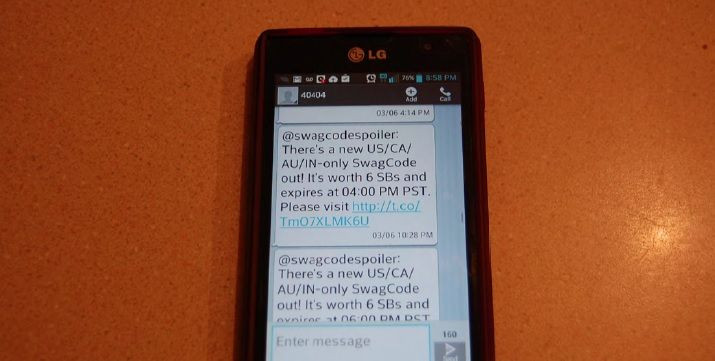Twitter Spam Lawsuit: Mobile Users Ambushed By Annoying Text Messages, Class Action Says

You might not be interested in joining Twitter, but that doesn’t mean the service won’t follow you anyway.
That’s according to a class-action lawsuit filed by a Massachusetts woman who claims she was hounded into a frenzy last year by recurrent text messages from Twitter Inc. (NYSE:TWTR), despite the fact that she never consented to the messages and doesn’t even have a Twitter account.
The lawsuit, filed last month in U.S. District Court in Northern California, said the plaintiff, Beverly Nunes, received a new cellphone number in November 2013 and almost immediately began receiving “impersonal, promotional text messages several times per day.” The messages came from Twitter’s text-messaging short code, 40404. Twitter has used the same code for several years; in fact, a quick Google search of the code reveals online complaints about frequent text messages dating back to at least 2010.
According to the Twitter help desk, texting the word “STOP” twice in succession should stop the updates, but Nunes claims the messages kept coming despite her explicit stop requests. The messages in question were solicitations to earn points from Swagbucks.com, an online rewards program. The lawsuit claims the messages are a direct violation of the 1991 Telephone Consumer Protection Act (TCPA), which restricts the use of automated telephone solicitations, including SMS (short message service) text messages.
“At no time did Plaintiff give prior express consent to Twitter to receive SMS text messages from it, let alone consent to receive autodialed telemarketing messages. Plaintiff has never had a Twitter account, has never used or followed Twitter, and has no pre-existing relationship with either Twitter or the advertisers for the text messages she received.”
According to the lawsuit, Twitter routinely sends text messages to cellphone owners who obtain recycled numbers, and it is by no means the only mobile marketer accused of doing so. Mobile providers have long recycled phone numbers to new customers, and new owners often find themselves inundated with texts and calls from marketers, spammers, debt collectors and a whole host of solicitors attempting to contact the previous owner. So prevalent is the problem that third-party companies such as Infutor, Nextmark List and Contact Center Compliance have cropped up to provide services they claim will identify and flag disconnected numbers, thereby allowing mobile marketers to remove the numbers from their lists.

The lawsuit alleges that Twitter is well aware its messages are sent to recycled phone numbers -- it would be reckless for the company not to be aware of it. The complaint points out that Twitter made 70 percent of its advertising revenue from mobile devices in 2013, and it says the company has an incentive to keep pumping out messages to people who have never signed up to receive them. “With nearly all of its revenue coming from advertising associated with the volume of activity on its system, each stop request is a loss of potential recurring revenue,” the lawsuit said. “Ultimately, consumers are forced to bear the costs of receiving these unsolicited and unauthorized text messages.”
Nunes is represented by San Francisco’s Keller Grover law firm, which filed the complaint as a class action, meaning other people in the same situation could possibly join the suit. Nunes is seeking damages (she could be entitled to a minimum of $500 per violation, according to the TCPA), legal fees and an injunction prohibiting Twitter from sending her any more texts.
A rep for Twitter did not respond to a request for comment.
Got a news tip? Email me. Follow me on Twitter @christopherzara.
© Copyright IBTimes 2024. All rights reserved.






















